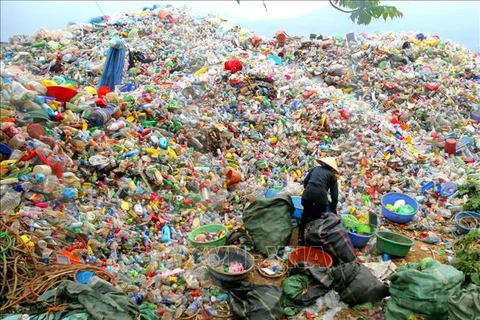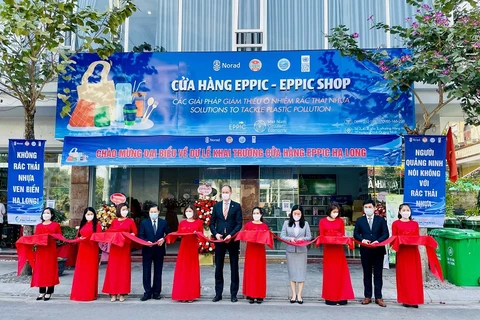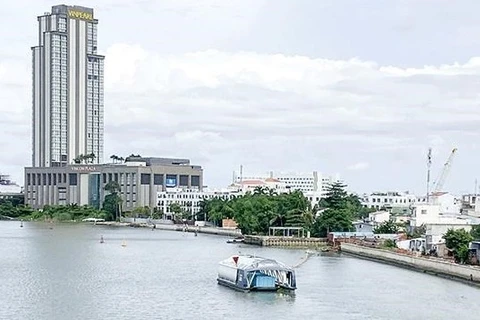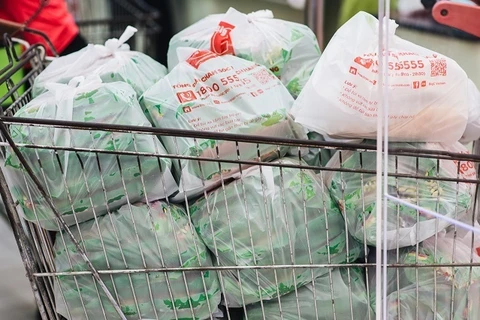HCM City (VNA) – HSBC Bank Vietnam has rolled out Vietnam’s first card made from recycled Polyvinyl chloride (rPVC) plastic as part of a programme launched by the HSBC Group to introduce sustainable cards across all its global locations.
The move underpins the bank’s strategy to reduce its carbon emissions and achieve net zero in its operations and supply chain by 2030 or sooner. Its ambition is eliminating single-use PVC plastic by the end of 2026, in favour of rPVC.
The rollout starts in January 2022 with its Premier MasterCard Credit, Premier Debit and Classic Debit cards. It will then extend across further card products from May 2022 tentatively.
The first rPVC cards will be issued to customers who requires new or replacement cards. To preserve the life of their existing cards for as long as possible, recycled plastic cards will be issued as their old cards naturally expire.
The new cards are made from 85 percent recycled plastics originating from industrial waste. HSBC’s move to rPVC cards is expected help reduce CO2 emissions by nearly half a tonne a year, and save 0.2 tonne of plastic per year.
Collectively, HSBC Vietnam together with other markets where the HSBC Group operates can help reduce CO2 emissions by 161 tonnes a year and reduce 73 tonnes of plastic waste per year globally.
The switch is a first step in a gradual transition to issue cards made from sustainable materials, and HSBC will continue to evaluate other alternative materials too.
“Replacing our cards will be another step as to help the bank and our customers make a positive impact on the environment,” said Pramoth Rajendran, Head of Wealth and Personal Banking at HSBC Vietnam. “There is no doubt that environment is of prime importance to Vietnam. The country is too familiar with the threats from climate change.”
“The move towards recycled cards enables HSBC and our customers to join hands together for a greener Vietnam, supporting the country’s climate action commitment at the COP26 which is reaching its net-zero carbon emission target by 2050,” he added.
Previously, to help retail customers reduce carbon emissions and contribute to shaping a zero-carbon future for the world, HSBC has enhanced and expanded its range of green loan products in Vietnam, offering preferential loans on green construction and rooftop solar energy, and more green lending to come in the near future./.
The move underpins the bank’s strategy to reduce its carbon emissions and achieve net zero in its operations and supply chain by 2030 or sooner. Its ambition is eliminating single-use PVC plastic by the end of 2026, in favour of rPVC.
The rollout starts in January 2022 with its Premier MasterCard Credit, Premier Debit and Classic Debit cards. It will then extend across further card products from May 2022 tentatively.
The first rPVC cards will be issued to customers who requires new or replacement cards. To preserve the life of their existing cards for as long as possible, recycled plastic cards will be issued as their old cards naturally expire.
The new cards are made from 85 percent recycled plastics originating from industrial waste. HSBC’s move to rPVC cards is expected help reduce CO2 emissions by nearly half a tonne a year, and save 0.2 tonne of plastic per year.
Collectively, HSBC Vietnam together with other markets where the HSBC Group operates can help reduce CO2 emissions by 161 tonnes a year and reduce 73 tonnes of plastic waste per year globally.
The switch is a first step in a gradual transition to issue cards made from sustainable materials, and HSBC will continue to evaluate other alternative materials too.
“Replacing our cards will be another step as to help the bank and our customers make a positive impact on the environment,” said Pramoth Rajendran, Head of Wealth and Personal Banking at HSBC Vietnam. “There is no doubt that environment is of prime importance to Vietnam. The country is too familiar with the threats from climate change.”
“The move towards recycled cards enables HSBC and our customers to join hands together for a greener Vietnam, supporting the country’s climate action commitment at the COP26 which is reaching its net-zero carbon emission target by 2050,” he added.
Previously, to help retail customers reduce carbon emissions and contribute to shaping a zero-carbon future for the world, HSBC has enhanced and expanded its range of green loan products in Vietnam, offering preferential loans on green construction and rooftop solar energy, and more green lending to come in the near future./.
VNA























